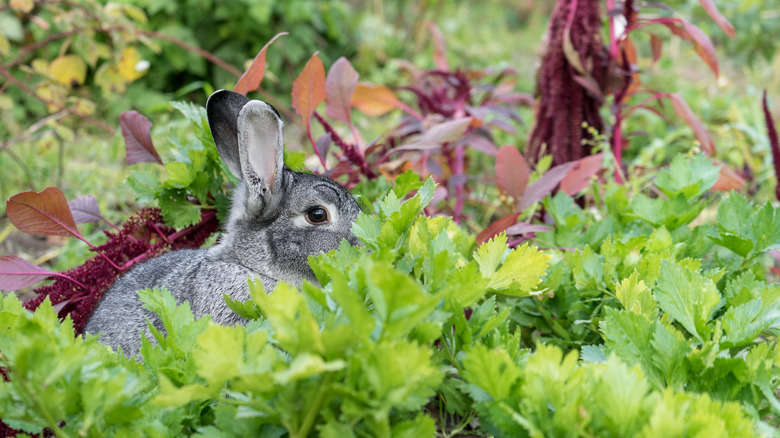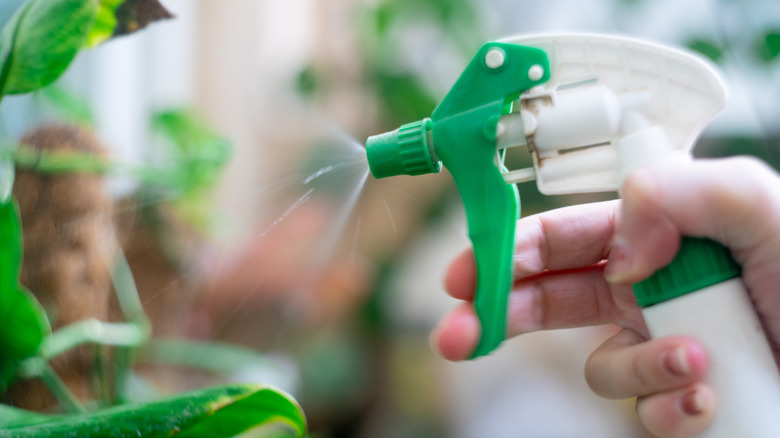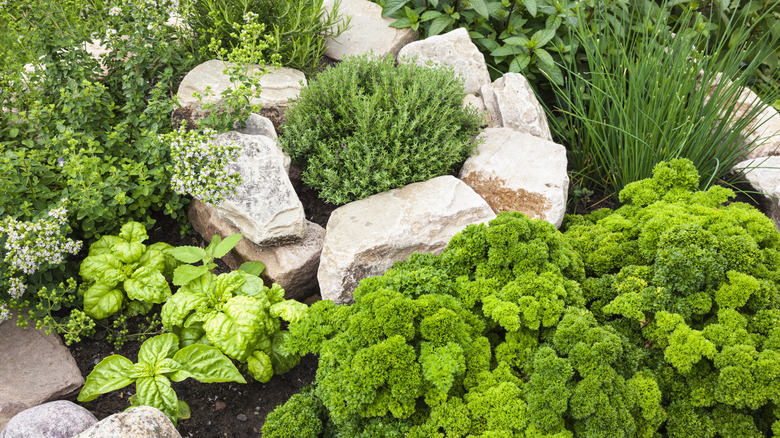The Minty Scent That'll Send Rabbits Hopping Away From Your Yard
While wild rabbits might seem harmless or charming, ask any seasoned gardener, and you'll hear about the frustrations associated with these herbivores. Those fuzzy, long-eared, relentlessly nibbling creatures can quickly turn any flourishing garden into a wasteland, thanks to their voracious appetite for all things green and crunchy, like grass, vegetables, leafy greens, and herbs. Before you know it, signs of their rampage – including missing plant parts, damage to tree bark, and intricate tunnel networks through your garden beds — will begin to surface. This all leads to the million-dollar question: How do you keep rabbits out of the garden without a fence or toxic chemicals? Peppermint essential oil could be the answer.
You see, rabbits, equipped with millions of scent receptors (per University of California Agriculture and Natural Resources), are far more sensitive to smells than humans. The invigorating peppermint aroma that we find refreshing and uplifting is unappealing, even overwhelming, to a rabbit's sensitive olfactory senses. That keeps them off areas diffused with the minty scent. Unlike many synthetic pest poisons on the market, peppermint essential oil is an organic and safe pest repellent, meaning minimal risk to your health and the balance of your garden ecosystem. You'll also experience the joy of affordability and versatility in its application as a homemade rabbit repellent. But remember to exercise caution when using essential oils, especially around pets.
Deterring rabbits with peppermint essential oil
The cotton ball essential oil hack is among the easiest ways to naturally keep rabbits out of the garden. The primary supplies you'll need are a bottle of peppermint essential oil and several cotton balls. But remember, essential oils can be harmful to your skin, according to a 2021 study by the International Journal of Women's Dermatology. It's recommended to wear gloves when working with these oils. Anoint each cotton ball with three to five drops of the peppermint essential oil. Then, position these mint-infused grenadiers in rabbit hotspots, such as vegetable patches, flowerbeds, and landscaped shrubs. Replacing the cotton balls biweekly or more frequently during rainy weather serves to maintain the might of your weapon. Otherwise, place the balls in sheltered spots that will keep them dry.
Fancy a more wide-ranging defense plan? Try peppermint spray for rabbits. Accompanying you in this endeavor will be a spray bottle (ideally 16 ounces or larger), water, and peppermint essential oil. Fill your bottle with water (leaving enough space at the top for oil and blending), add 15 to 20 drops of peppermint essential oil, seal, and shake it all like your garden's fate depends on it (because it kind of does). Next, spray those plants that bunnies love to munch and fortify the boundaries of your garden, concentrating on tree bases, fences, and rabbit entry points. As with the cotton ball method, this peppermint cocktail calls for regular reapplication, roughly every seven days and post-rainfall.
Caveats for peppermint essential oil spray for rabbits
A bottle of essential oil might not always be stashed in our cupboards. In such cases, the peppermint plant can swoop in to save the day. Using a blender or food processor, churn fresh peppermint leaves and stems into a puree, dilute with water, and then "make it rain" using a handy spray bottle. For that extra kick, you could distribute peppermint oil-soaked cotton balls throughout your vegetables and mist the spray on the periphery plants. However, word of caution: Certain plants don't do well with peppermint oil. So, test on a single leaf or plant and observe for nasty botanical casualties in the next 24 hours.
Now, on to the downsides of peppermint oil. Essential oils can be toxic to dogs and cats, whether through ingestion, inhalation, or even a dash on the skin (per ASPCA). So, be cautious. And should you get any essential oil in your eyes, a thorough milk rinse followed by a cool water flush will soothe them.
On the hunt for more alternatives? Planting mint in your yard is an excellent idea, albeit with some TLC. And if peppermint doesn't do the trick, consider other rabbit-repellent plants such as onions, garlic, sage, thyme, and marigolds (or a dusting of sulfur, ground red pepper, or lime powder). But why invite trouble in the first place? Trimming dense foliage and clearing heaps of litter or dried leaves goes a long way toward keeping these adorable, furry invaders away.


